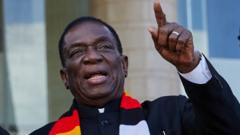The recent political shake-up in Zimbabwe reveals deepening rifts within the ruling party as President Mnangagwa faces calls to resign, leading to significant military appointments.
**Zimbabwe's President Appoints New Army Chief Amidst Rising Tensions**

**Zimbabwe's President Appoints New Army Chief Amidst Rising Tensions**
In response to mounting pressure, President Emmerson Mnangagwa has appointed Emmanuel Matatu as the new army chief just before expected protests.
Zimbabwe's President Emmerson Mnangagwa has made a strategic move by appointing Emmanuel Matatu as the new army chief, effective immediately. This decision comes at a critical time, with protests planned for Monday by a faction of war veterans demanding the president's resignation due to allegations of mismanagement and corruption.
Matatu, a former major general and veteran of the liberation war in the 1970s, takes over from Lt Gen Anselem Sanyatwe, who has been reassigned as the minister of sports, arts, and culture. The 72-year-old Matatu is perceived as a loyal supporter of Philip Valerio Sibanda, the current head of the Zimbabwe Defence Forces (ZDF), further solidifying the military's alignment with Mnangagwa's administration.
The backdrop of these changes reflects a turbulent political landscape as the Zanu-PF party grapples with internal divisions. Gnawed by rumors of Mnangagwa's ambition to extend his presidential term beyond his current mandate, which expires in 2028, dissent is on the rise among former allies. Although Mnangagwa has publicly stated intentions to step down, skepticism lingers within his party.
As preparations for the protests unfold, the security minister has issued warnings against participation, while police have enforced a prohibition on carrying weapons near the capital. The situation remains fluid as the war veterans, some advocating for Vice-President Constantino Chiwenga's ascension, add pressure on the current leadership, igniting reminders of the political upheaval that led to the downfall of long-time president Robert Mugabe in 2017.




















